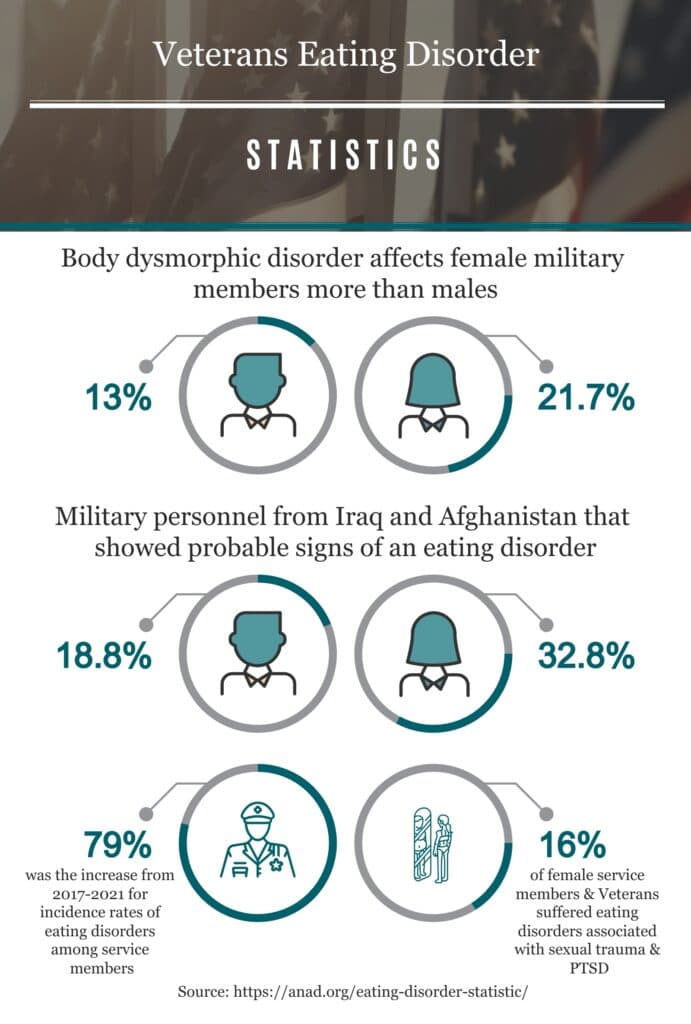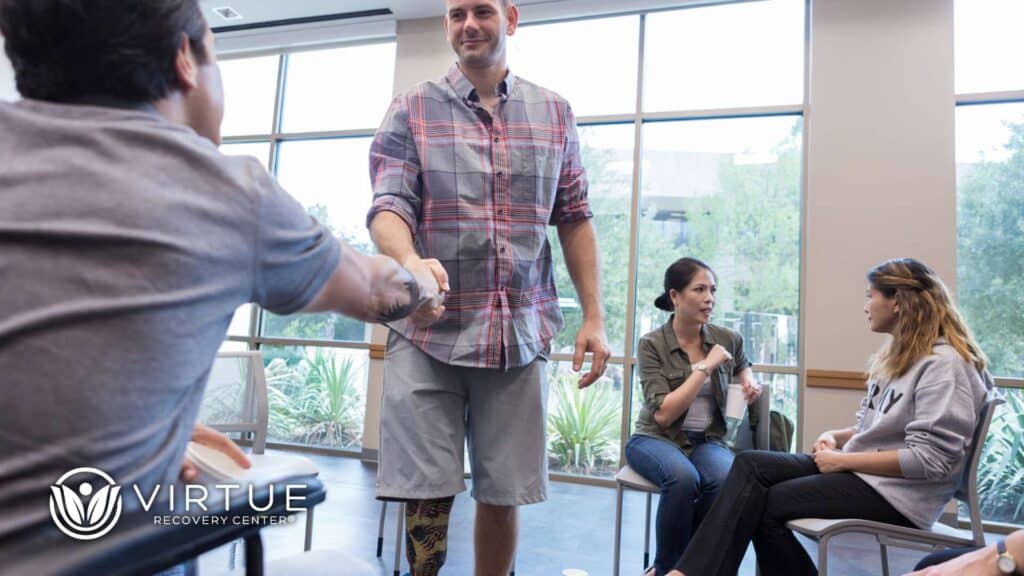Key Takeaways
- Military Veterans Face Unique Challenges: Many veterans deal with PTSD and mental health issues, increasing the risk of substance use disorders.
- Common Substances Used by Veterans: Veterans often turn to alcohol, prescription drugs, and other substances to cope with stress and trauma.
- Barriers to Seeking Help: Veterans may face stigma or lack access to care, making it harder to seek addiction treatment.
- Help is Available: Specialized treatment programs for veterans offer tailored support for mental health and substance use.
Introduction
Veterans face unique challenges, including physical injuries, mental health disorders, and trauma from their military service. These struggles can lead to a higher risk of substance use disorders. For many veterans, using alcohol or drugs becomes a way to cope with the difficulties of transitioning back to civilian life or dealing with the pain and memories of combat. In this article, we’ll explore why veterans are more likely to face addiction and what treatment options are available to help.
Why Veterans Face a Higher Risk for Addiction
Serving in the military can be incredibly stressful. Veterans often experience things that most civilians will never have to face, such as combat, separation from loved ones, and long periods of intense pressure. These factors can lead to conditions like post-traumatic stress disorder (PTSD), depression, and anxiety.
When veterans return home, they may struggle to adjust to civilian life. The stress of transitioning, along with untreated mental health issues, can make veterans more likely to turn to substances like alcohol or drugs. This is especially common among veterans with PTSD. Instead of seeking help, some veterans may self-medicate with alcohol, prescription drugs, or other substances to numb their feelings.
Common Substances Misused by Veterans
Veterans are more likely than the general population to develop substance use disorders. Some of the most commonly misused substances include:
- Alcohol: Alcohol abuse is widespread among veterans, especially those who suffer from PTSD. Drinking may start as a way to relax, but it can quickly turn into dependency.
- Prescription Drugs: Veterans who have been injured during their service may be prescribed pain medications, such as opioids. Unfortunately, some veterans may become dependent on these medications.
- Illicit Drugs: In some cases, veterans may turn to illegal substances like cocaine, methamphetamines, or marijuana as a way to escape from their emotional pain.
Substance use among veterans doesn’t just affect their health—it can also harm their relationships, job prospects, and overall quality of life.
The Connection Between PTSD and Substance Use Disorder
PTSD and substance use disorder often go hand in hand. Veterans with PTSD may turn to drugs or alcohol as a way to manage their symptoms, such as flashbacks, nightmares, and anxiety. While these substances may offer temporary relief, they can make the underlying mental health issues worse.
When a veteran struggles with both PTSD and addiction, they have what’s called a co-occurring disorder or dual diagnosis. This means they need specialized care that addresses both their mental health and their substance use at the same time. Without proper treatment, veterans with dual diagnosis are more likely to experience relapses and struggle to maintain long-term sobriety.
Barriers to Seeking Addiction Treatment for Veterans
Despite the availability of care, many veterans hesitate to seek treatment for substance abuse. The stigma around mental health issues and addiction can make veterans feel like they need to handle their problems alone. Some veterans may also worry about how seeking help could impact their military benefits or careers.
Additionally, accessing treatment through the Department of Veterans Affairs (VA) can sometimes be challenging due to long wait times or difficulty navigating the system. These barriers can prevent veterans from getting the help they need when they need it most.
Treatment Options for Military Veterans
Thankfully, there are many treatment options available to help veterans overcome substance use disorders. Treatment programs designed explicitly for veterans take into account the unique challenges they face. These programs often offer:
- Inpatient and Outpatient Treatment: Depending on the severity of the addiction, veterans may need either inpatient (residential) care or outpatient treatment that allows them to return home after therapy sessions.
- Dual Diagnosis Treatment: For veterans with both PTSD and substance use disorder, dual diagnosis programs provide comprehensive care that addresses both issues.
- Support Groups: Veterans may find comfort in group therapy, where they can share their experiences with others who understand what they’re going through.
- Therapy: Cognitive Behavioral Therapy (CBT), trauma-focused therapy, and counseling can help veterans process their trauma and develop healthier coping mechanisms.
If you or a loved one is a veteran struggling with addiction, it’s essential to know that help is available. Many treatment centers offer specialized care tailored to the needs of veterans, focusing on both their mental health and their substance use.

Conclusion
Veterans face a higher risk for addiction due to the unique challenges they experience during and after their military service. Substance use disorders can have a devastating impact on veterans’ lives, but recovery is possible with the proper support. Addiction treatment programs designed specifically for veterans address both the mental health and substance use issues that many veterans face, providing a path to long-term recovery.
If you or a loved one is a veteran struggling with substance use disorder, don’t wait to get help. Call Virtue Recovery Las Vegas at 866-520-2861 to start your recovery journey.
FAQs About Veterans & Substance Abuse
Why are military personnel and veterans at higher risk for substance abuse?
Veterans often face unique challenges such as PTSD, depression, and anxiety, which can increase the risk of turning to substances like drugs or alcohol to cope.
What substances are commonly abused by veterans?
Veterans commonly misuse alcohol, prescription drugs, and illicit drugs as a way to deal with the stress and trauma from their military service.
How does PTSD impact substance use among veterans?
Veterans with PTSD often use substances to manage their symptoms, but this can lead to addiction and make their mental health issues worse.
What treatment options are available for veterans with addiction?
Veterans can access specialized treatment programs, including inpatient and outpatient care, dual diagnosis treatment, and support groups.
How does Virtue Recovery Las Vegas support veterans in recovery?
Virtue Recovery Las Vegas offers comprehensive addiction treatment programs designed to meet the unique needs of veterans, helping them achieve long-term recovery.
Resources
https://nida.nih.gov/publications/drugfacts/substance-use-military-life
https://www.ncbi.nlm.nih.gov/pmc/articles/PMC5587184/
https://www.va.gov/health-care/health-needs-conditions/substance-use-problems/
https://www.dmva.pa.gov/Veterans/SpecialInitiatives/Pages/SubstanceUseDisorder.aspx
https://www.nyc.gov/site/veterans/services/substance-abuse.page









